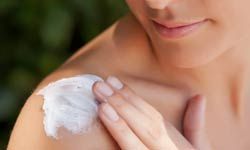Cancer Myth 3: You can prevent skin cancer by putting on one application of sunscreen at the start of each day.
Respondents Who Agreed: 43 percent
Origin of Myth: Poor understanding of directions for sunscreen use.
Reality: The use of sunscreen on a daily basis is a good practice for reducing skin cancer risk. The problem with it is that it can sometimes give a false sense of security. Sunscreen needs to be reapplied, and even then it still only confers a certain amount of protection.
Mistakes in sunscreen use are common and may indicate that people don't understand the importance of protecting themselves from skin cancer. Visible symptoms of skin cancer don't show up for many years, and not long ago a tan was considered healthy. A sunburn will fade in a few days - out of sight, out of mind. The problem is what people don't see can hurt them. Sun damage remains in deeper layers of skin. It's cumulative and can eventually cause cancer.
More than 1 million cases of the curable basal cell or squamous cell cancers will be diagnosed this year. The most serious skin cancer, melanoma, is expected to be diagnosed in about 54,200 people in 2003.
Dermatologist Mark Jaffee, M.D., tells people, "Skin cancer develops slowly over time. Almost picture it as a photograph developing. The damage is done, the exposure's been done, and we're just waiting years and years for that damage to show itself on the surface of the skin."
How to Shield Your Skin
To insure your skin is safe from UV rays, make sun protection a daily habit and a part of the ritual of going to the pool, beach or park. Keep hats, long-sleeved shirts, sunscreen and other supplies near the door in a small duffel bag or in your car. Review the five protective methods listed below, and try to expand beyond only using sunscreen.
- Cover up. Choose shirts and pants to protect as much skin as possible.
- Use sunscreen. Choose a sunscreen with a sun protection factor (SPF) of 15 or higher.
- Wear a hat. Choose a hat that shades the face, neck and ears.
- Wear sunglasses. Protect your eyes with sunglasses that block UV rays.
- Limit sun exposure. Stay out of the sun between 10 a.m. and 4 p.m., when UV rays are strongest.
Avoid Sunscreen Mistakes
For people with fair skin who can begin to burn in 15 minutes of bright sunlight, using sunscreen every day is important, and it should be reapplied according to the directions on the bottle. Many companies recommend another coat of sunscreen every two hours.
For maximum effect, generously apply sunscreen 20 to 30 minutes before going outside. About a palm-full of sunscreen should be used to cover the arms, legs, neck and face of the average adult.
If swimming or perspiring, you will probably need to reapply sunscreen more often than usual. Remember that sunscreen usually rubs off when you towel yourself dry.
Products labeled "waterproof" provide protection for at least 80 minutes even when swimming or sweating. Products that are "water resistant" may provide protection for only 40 minutes. Most sunscreen products expire within two to three years, but you should check the expiration date on the container for the date it becomes ineffective.




